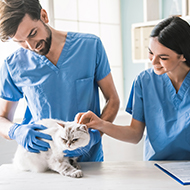
RCVS framework recognises the importance of professional, 'non-technical', skills.
A new set of Day One Competences, describing the knowledge and skills expected of veterinary students upon graduation, has been published by the RCVS.
In a press release, the RCVS describes the competences being 'within a conceptual model of continuous learning and with animal welfare at its heart.' There are four areas each containing detailed competences, including:
Personal leadership: the competences under this heading set out the attitudes and behaviours expected of a professional veterinary surgeon and includes knowledge of the RCVS Code of Professional Conduct, recognition of one’s own abilities and limitations, and how to react and/or act in different situations and circumstances.
Professional commitment: these competences encompass the graduate’s professional capabilities around the business aspects of veterinary practice. Competences in this domain recognise that graduates are not expected to have full knowledge of how to run a successful business, but that they should be aware of the way the profession operates, both in terms of businesses that exist within the profession and also outside the profession in related areas.
Reflective relationships: the competences under this heading concern professional relationships including with those whom graduates work directly with and those in other locations and areas of the profession as well as allied professionals and with clients. Understanding how to communicate and collaborate effectively is key for the competences within this domain, as they are central to forming and maintaining the relationships that will exist within a veterinary surgeon’s professional life.
Vet capability: this domain describes the clinical competences, and encompasses the practical skills, techniques and underlying veterinary scientific knowledge that veterinary surgeons must possess upon graduation. By meeting these competences, graduates demonstrate that they are ready to carry out clinical procedures independently (to a day one competence standard). The majority of the competences lie within this domain.
The RCVS developed the new model following feedback garnered during its Graduate Outcomes consultation. The consultation explored how the RCVS, working with the UK veterinary schools, could better prepare veterinary students for life in practice and ensure that new graduate vets were better supported during their first years in practice.
“Developing new Day One Competences was one of the key strands of the Graduate Outcomes consultation and we are very glad that we can now deliver on this important work,” explained Professor Stephen May, who led the Graduate Outcomes Working Party.
“While clinical and scientific skills will always be a central focus of a degree in veterinary medicine, the new framework recognises that professional (“non-technical”) skills, such as effective communication, relationship-building, reflective practice, business acumen and professional responsibility, are as important in successful practice as technical aspects of veterinary work.”
Professor May continued: “One of the key findings of the Vet Futures project, which in turn led to us launch Graduate Outcomes, was that a significant reason why new graduates sometimes felt disengaged with and disappointed by life in clinical practice, was the divide between the technical aspects of what they learned in vet school and the realities of life in practice where technical knowledge needs to be used effectively alongside the other important professional skills.
“The new Day One Competences build upon what the RCVS expects of new graduates in all these areas.”
RCVS Education Committee chair Susan Paterson added: “Over the coming years we look forward to working with the vet schools to ensure these competences continue to be incorporated and embedded within their curricula and hope that, in time, the new framework will help meet the aim to better prepare our graduates and new colleagues for life in practice”
For the full documentation on the Day One Competences click here.



 The Veterinary Medicines Directorate (VMD) is inviting applications from veterinary students to attend a one-week extramural studies (EMS) placement in July 2026.
The Veterinary Medicines Directorate (VMD) is inviting applications from veterinary students to attend a one-week extramural studies (EMS) placement in July 2026.